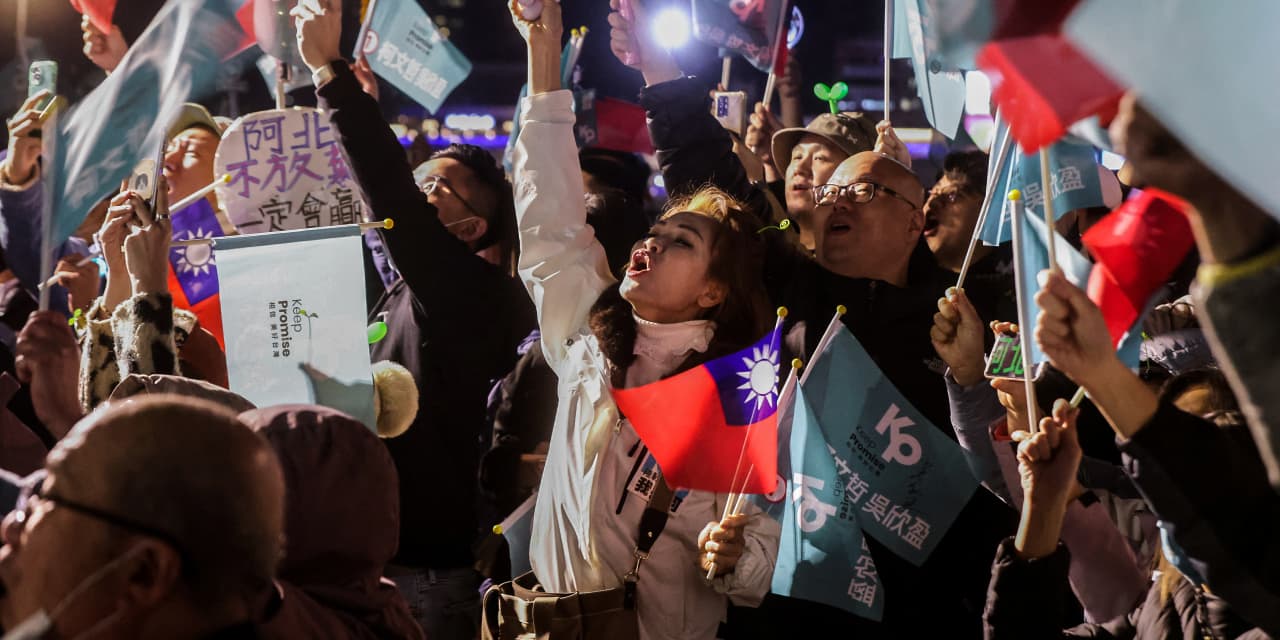Taiwan kicks off a record year for elections around the world, with voters heading to the polls on Saturday. The outcome could create ripples in the tense relationship between the U.S. and China—which claims the island democracy as its own.
The impact on markets, though, may be more subdued.
Though tiny, Taiwan casts a long geopolitical shadow. Not only is its dominant semiconductor industry vital to the global economy, the island is situated in a critical location militarily as the U.S.-China rivalry heats up, giving the presidential election outsize attention. Taiwan’s electorate favors maintaining the status quo even as Chinese leader Xi Jinping’s New Year’s address said reunification was inevitable.
Polls show a close race with Vice President Lai Ching-te, of the ruling Democratic Progress Party (DPP), leading over the former policeman-turned-Kuomingtang party (KMT) candidate Hou Yu-ih, who is favored by mainland China, and Ko Wen je, the former mayor of Taipei and member of the populist newcomer Taiwan People’s party (TPP).
A DPP victory—which would be unprecedented because it would be the first time the party secured a third consecutive term—could hit the market a bit initially as investors worry about China’s response. Analysts noted that Beijing likes Lai even less than current President Tsai Ing-wen. Lai’s comment in the last presidential debate that China and Taiwan had no affiliation sparked backlash from Beijing.
Fund managers and analysts see a muted near-term impact to markets, even as they expect the election to reshape Cross-Straits relations over time. That outlook could be upended if the election is swayed by political interference, if results lead to protests, or an overwhelming victory by the ruling DPP pushes China to respond in novel and more aggressive ways than it did when former House Speaker Nancy Pelosi visited Taiwan in 2022.
Markets seem to reflect the muted near-term view, closing at a record high up 27% as foreign and domestic investors increased allocations on expectations of a recovery in semiconductors and artificial intelligence-related companies. The
iShares MSCI Taiwan
exchange-traded fund is down 4% so far this year.
How China responds will be crucial. The expectation is that a Lai victory will be a narrow one, and the opposition is likely to take the majority in the legislature.
“Beijing will need a bigger provocation than just Lai’s election—such as aggressive pro-independence rhetoric—to resort to a major display of force,” Gavekal analysts Yanmei Xie and Tom Miller wrote in a note to clients. “Investors are right to discount the downside risks and position themselves for the upside.”
While China could resort to sanctions, Capital Economics Chief Asia economist Mark Williams expects such moves to be relatively modest and in keeping with the status-quo pushback of recent years. Any sanctions would spare the island’s critical chips and other tech products, which China has never sanctioned before— likely because it would bring pain to its own economy, he said.
“That reticence is unlikely to be changed by another DPP leader winning the presidency, as long as Lai doesn’t depart from the policies of President Tsai,” Williams writes in a note to clients.
A win by the opposition, however, could lift stocks—in Taiwan and possibly those related to China as it pushes worries about an invasion by China of Taiwan off the near-term list of geopolitical risks. China could also roll back some of the sanctions it imposed on Taiwan—with those on travel, with bans on individual tourist visits that started in 2019 having had the biggest bite. A complete reversal could lift Taiwan’s GDP by about 1% over the next couple of years, according to Capital Economics.
If the opposition wins, TS Lombard Chief China economist Rory Green favors domestic Chinese companies with exposure to mainland China, like
Foxconn Technology
; tourism and agriculture companies as Beijing pushes for closer Cross-Straits relations, and he would short Taiwanese defense companies as the opposition is unlikely to spend as much on beefing up the military.
For investors worried about China’s unification plans down the road, the focus is on how China responds over the coming year.
“China has enormous economic challenges right now and the focus is overwhelmingly on that,” said economist Keyu Jin, author of “The New China Playbook: Beyond Socialism and Capitalism,” at a Citi Year-Ahead conference this week. “The desire for peace is underappreciated for a country with so many people who have living memory of what turbulence and instability means.”
Gavkeal analysts also played down the risk of a hot conflict in the Taiwan Strait in the next couple of years, noting reports of chaos in China’s armed forces as Xi has booted out more than a dozen senior military officials. U.S. intelligence reportedly found missiles filled with water rather than fuel.
If the report is right, the analysts expect it will be a while before Xi could launch a successful military move against Taiwan. The bigger wild card could come from the U.S. election in November, and how the new administration handles its relations with China.
The bigger risk in the medium-term could be an economic blockade by Beijing of Taiwan rather than invasion. Those looking to brace for global risks if the DPP wins can buy Korean chip makers and sell Taiwanese chip makers as companies look to diversify, TS Lombard’s Green said in a recent briefing.
Write to Reshma Kapadia at [email protected]
Read the full article here




